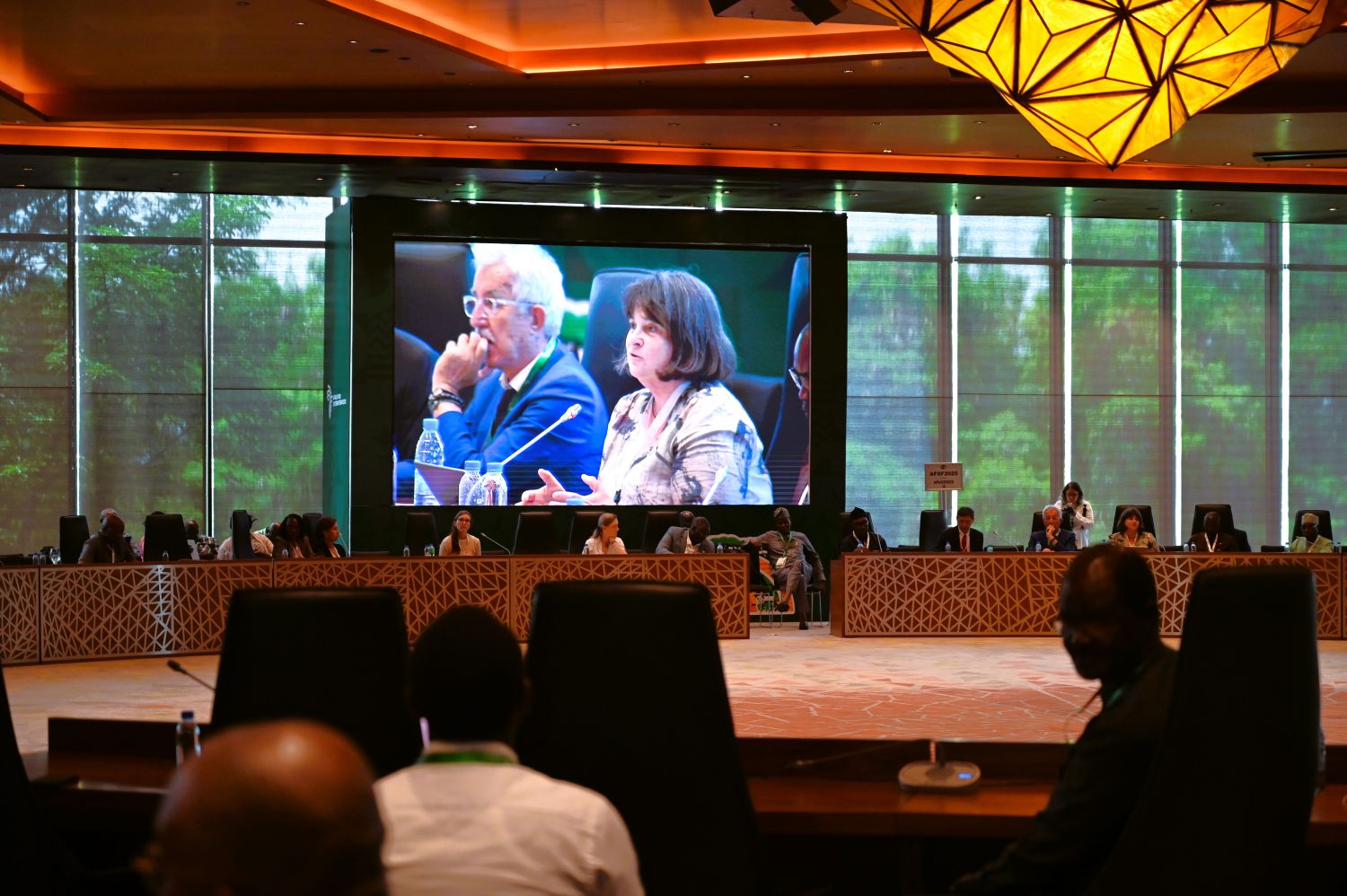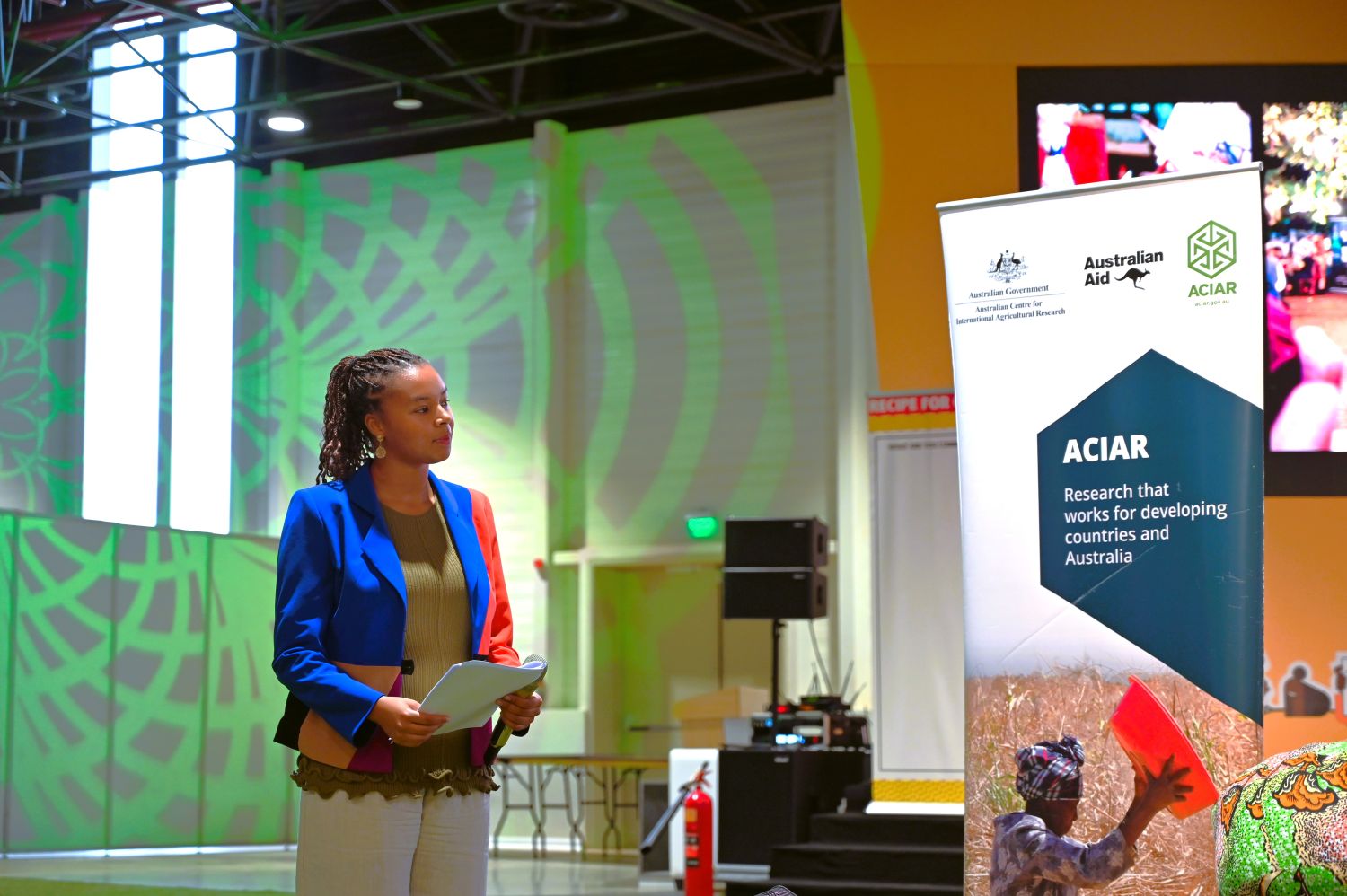Across Africa, young people and women are turning food and agricultural challenges into opportunities for innovation, employment and cultural preservation. This momentum was on full display recently at the Africa Food Systems Forum (AFSF).
The week-long Forum, a flagship platform for policymakers, researchers and practitioners shaping sustainable, inclusive and resilient food systems, highlighted the critical role of youth and women in transforming agriculture across the continent.
ACIAR sponsored the Forum under the Australian Government's Africa-Australia Partnership for Climate Responsive Agriculture (AAPCRA) and contributed to climate resilience, women's empowerment and research innovation sessions, while also supporting youth-led initiatives.
Capacity building and climate resilience
At the climate resilience session, Dr Steven Crimp, ACIAR Research Director, emphasised the direct link between global environmental agreements such as the Rio Conventions on climate change, biodiversity and desertification, and the livelihoods of African farmers, particularly young people.
'Climate, nature, and soil aren't abstract; they are the foundations of farmer incomes, youth employment and resilient food systems. Research-driven solutions turn these challenges into opportunities for green jobs and lasting impact.'
He pointed to ACIAR-funded initiatives that illustrate this approach. The Virtual Irrigation Academy reduces water use by up to half, while picture-based crop insurance leverages mobile phones to verify losses.
The Kuza Matunda App equips farmers with the know-how on the right trees for the right soils, combining biodiversity with technology.
Youth entrepreneurs are at the forefront of translating such innovations into action.
'For instance, Ms Talash Huijbers, a young co-founder of InsectiPro and beneficiary of the PROTeinAfrica project, produces three tonnes of insect protein daily for livestock feed, employs over 40 young people, most of them women, and reduces poultry feed costs by up to 30%,' said Dr Crimp.

The researcher's forum featured Dr Suzie Newman, ACIAR General Manager, Partnerships. It highlighted mentorship, capacity building and linking research with practice as essential for sustainable agricultural transformation.
Dr Newman underscored the importance of structured support. 'Investing in research creates knowledge; investing in mentorship creates leaders. When young scientists are guided, women are empowered and institutions are strengthened. African farmers and communities feel the impact every day.'
ACIAR capacity development programs such as the John Allwright Fellowship, John Dillon Fellowship, Merryl Williams Fellowship and ACIAR Learn have collectively nurtured hundreds of alumni who are now shaping agriculture across Africa, Asia and the Pacific.
Notably, 71% of John Allwright fellows now mentor peers in their home countries, with women comprising half of the new scholars.
Elevating women benefits all
Women-led enterprises and empowerment initiatives also featured prominently at AFSF.
Dr Bosibori Bett, ACIAR Director, Multilateral and Strategic Partnerships, highlighted initiatives improving nutrition while creating entrepreneurial opportunities for women.
Programs such as biofortified beans through PABRA and the NutriFish program exemplify how high-impact nutrition interventions can enhance diets, generate income and strengthen community resilience.
Combined with data from the African Women in Agricultural Research and Development (AWARD), the session confirmed that closing gender gaps boosts productivity, nutrition and community resilience, demonstrating that empowering women is both equitable and strategic.
'When a woman saves hours of cooking time, gains income from seed multiplication and processing, fuel costs drop, children eat more nutritious meals, and household health improves, that's sustainable impact. Additionally, when female leadership is at the centre, innovation doesn't just improve yields; It transforms nutrition, livelihoods, and opportunity for generations,' said Dr Bett.
Young people shape the conversation
Complementing these discussions, AAPCRA sponsored a youth-led side event, 'Local Food Culture as Currency - From Dependence to Abundance', hosted by the Ghana Food Movement.

The network of young chefs, farmers, entrepreneurs, scientists, nutritionists and students showcased how indigenous crops and food culture can drive economic growth, improve nutrition and foster entrepreneurship.
Participants engaged in tastings, discussions and co-creation of solutions to strengthen local food systems.
'Impact comes from projects being locally led, context-specific and evidence-based,' said Dr Leah Ndungu, ACIAR Regional Manager, Eastern and Southern Africa.
'Youth should not just be spoken about on panels; they should shape the conversations. Sponsoring this dynamic group has shown us the value of listening to youth as they are innovative thinkers, translating to dynamic solutions.'
As Africa prepares for COP30, AFSF showcased homegrown solutions that are ready to be scaled and shared across the continent and beyond.






